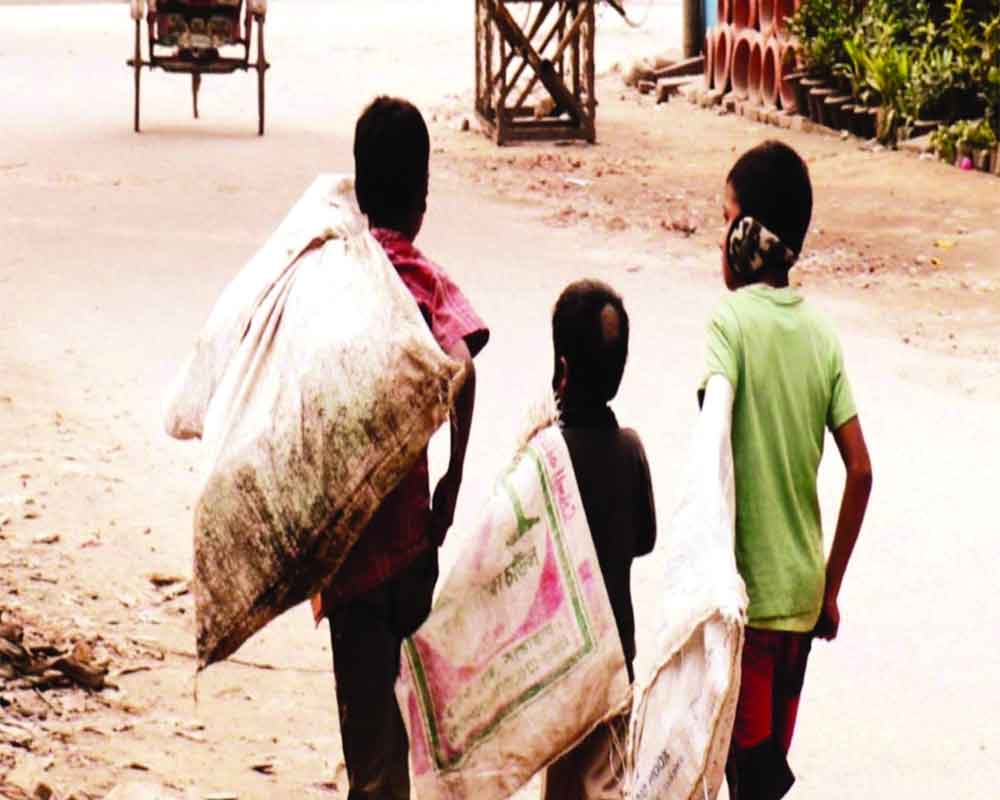Strict laws are urgently required to stop child trafficking as new methods of the illegal trade challenge the existing system
The recent case of rescue of a 14-year old minor girl from a village in Kaithal district of Haryana in May this year highlights a morally and socially unsettling case of "child trafficking" that is on the rise. The minor from Jehanabad district in Bihar, was first drugged and trafficked from Patna railway station and was then sold to a 19-year old man for Rs. 1.7 lakhs. The dismaying story not only jolted the morality of the society but also underscored the vulnerability of minor girls of being trafficked at ease. The girl was rescued following an inter-state operation involving Bachpan Bachao Andolan (BBA), anti-human trafficking units (AHTU), police and district child protection units (DCPU) of Bihar and Haryana. Shockingly, it was found that the marriage was solemnized on fake identity cards showing false age.
In another case in August 2017, a 15-year old young boy from West Bengal Rehan (name changed) was trafficked to Delhi in lure of job and shelter. But he was sold to a factory owner in the outskirts of Delhi for forced labour. Rehan was forced to share a tin-roofed small shelter along with 20 other kids of his age. He and other boys were made to work for up to 18 hours a day without wages and rest. He was saved by BBA and other government agencies and a case was registered against the factory owner.
Such incidents highlight the magnitude of the problem of child trafficking and the increased threat to young girls from the most vulnerable sections of our society. Young children hailing from poor families in Bihar, Jharkhand, Assam, West Bengal, Odisha and the North-Eastern states are trafficked to metropolises and big cities in lure of jobs and better life and then pushed into prostitution, forced slavery and other illicit activities. Apart from these "source states", young children from Nepal and Bangladesh are also trafficked. Majority of children have been found to be trafficked by the Railways to the metropolises.
Majority of the so-called "placement agencies are unregistered and they hire ground agents to identify innocent children from these regions for trafficking. They sell the trafficked children to different categories of customers like - massage parlours/spa centres, rich families, prostitution rackets and escort services and families in Haryana as child brides.
These agencies cater to the interests of their customers with wide-ranging services including providing nurses, who are mostly untrained, house-maids, hotels and factory owners. In majority of cases age of the children are forged and they are forced to work as bonded labourers with unpaid wages, proper food and clothes, rest and health care. The rich and affluent believe that they have rescued the girls from drudgery and are obliging them by providing shelter and employment and enriching their lives. On the contrary, it has been observed in most cases, the financial condition of the victim's family remains same, while the trafficked child suffers both physically and mentally.
BBA has been campaigning against child trafficking since the early 1990's, when the terminology was not even used in the mainstream media to describe such incidents. It was in 1997, after BBA launched its "Mukti Caravan Abhiyan" in Bihar against child trafficking, the terminology came into common parlance. Village melas were organized where people participated in large numbers, these melas were used to gather information about missing children to track and identify their whereabouts. In 2007, Nobel Peace Laureate, KailashSatyarthi launched a "South Asian March Against Child Trafficking" from Kolkata to Kathmandu to raise awareness against the rising crisis. This was the first such march against child trafficking and brought the raging issue into the mainstream glare. Since its inception BBA has rescued over 1,00,000 children most of whom were trafficked from the source states to metropolises.
Additionally, the recent memorandum of understanding (MoU) with Railway Protection Force (RPF) in May has enabled in increase of raids leading to rescue of kids and arrest of traffickers. In the last two months, BBA and RPF team's joint operations have succeeded in rescuing 338 children from traffickers. This has now lead the traffickers to change their mode of trafficking. The traffickers send private buses with tinted glass and curtained windows to source states to traffic children, in some cases trucks have also been used for trafficking. Women and couples are used to pose as parents of the children to hoodwink the government authorities. In worst cases, the trafficked girls are forced into selling their new-born infants to childless couples for lakhs of rupees.
The need of the hour is strict law that not only stops this illicit trade but also prevents rise of child trafficking in future. It's an urgent appeal to the government pass the draft bill Trafficking in Persons (Prevention, Care and Rehabilitation) Bill, 2021 released during last year's monsoon session inviting comments and feedback. The bill among other provisions had widened the scope of the offences and also contains strict punitive action related to offences against child.
(The writer is Executive Director, Bachpan Bachao Andolan (BBA))


























